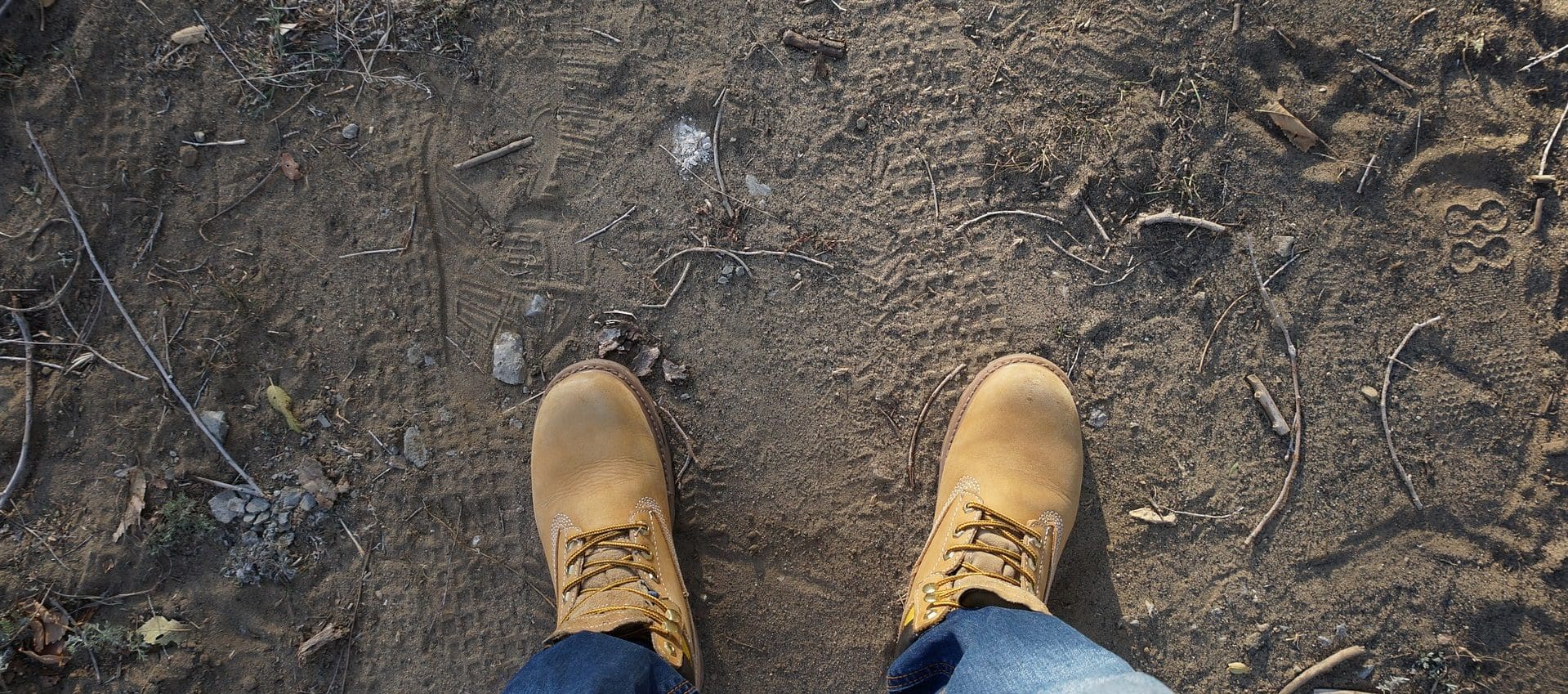His bare feet stuck out of the passenger window. We live in a seaside town, and feet like his are a fairly common sight during our long, hot summers. Sunburned on top, cracked and callused on the bottom, his feet give us a glimpse of the day this man just completed.
Our feet tell the story of who we are and where we’ve been. We inherit their shape and size from our parents, but we gather the scars and calluses along the way. Without support, our feet can only travel so far. Exposed to the weather, too sensitive to carry us across harsh surfaces, and easily fatigued, our bare feet cannot stand on slippery, treacherous terrain.
We need shoes.
Likewise, “gospel shoes” allow us to stand when we face the difficult circumstances described in Ephesians:
Therefore take up the whole armor of God, that you may be able to withstand in the evil day, and having done all, to stand firm. Stand therefore, having fastened on the belt of truth, and having put on the breastplate of righteousness, and, as shoes for your feet, having put on the readiness given by the gospel of peace. In all circumstances take up the shield of faith, with which you can extinguish all the flaming darts of the evil one; and take the helmet of salvation, and the sword of the Spirit, which is the word of God. (Ephesians 6:13-17)
Our journey is a spiritual battle; we can’t walk into battle unprepared and barefoot. The gospel gives us a firm foundation the same way that shoes give the soldier firm footing.
Here are three questions to answer before we enter the battles ahead.
What Is the Gospel of Peace?
Anxiety disorders affect approximately 18 percent of the adult population in the U.S., with 22 percent of those cases (or 4 percent of the U.S. population) being classified as suffering from severe anxiety (National Institute of Mental Health). Social media often paints a false picture of beautiful, successful people in healthy relationships with perfect children, but below the surface, people everywhere struggle to find a moment of peace.
The gospel is the good news that Christ saves sinners by grace through faith, and this good news gives us peace when circumstances are more than we can bear. The daily battles we face—conflicts in relationships, roadblocks at work, financial distress, temptations to sin, or health-related struggles—threaten to overwhelm. Jesus warned that we would face trouble, but in the same breath, he promised that he would walk through the trouble with us.
I have said these things to you, that in me you may have peace. In the world you will have tribulation. But take heart; I have overcome the world. (John 16:33)
The gospel promises rest. The invitation is open:
Come to me, all who labor and are heavy laden, and I will give you rest. Take my yoke upon you, and learn from me, for I am gentle and lowly in heart, and you will find rest for your souls. For my yoke is easy, and my burden is light. (Matthew 11:28-30)
In battle, believers fight “spiritual wickedness in high places” (Ephesians 6:12). In sharp contrast to the chaos of warfare, Christ offers the good news of peace through his death and resurrection.
What Does the Gospel Do?
Ephesians describes the “readiness given by the gospel of peace.” Readiness for what? This verse is linked to “shoes for your feet,” so I assumed it meant I should be ready to go. But in context, I realize that the gospel makes me ready to stand.
The gospel is one of three pieces of armor described in Ephesians 6: truth, righteousness, and the gospel of peace. All three prevent the soldier from slipping and falling in battle. According to one Bible commentary, “The Roman sandal was furnished with nails that gripped the ground firmly, even when it was sloping or slippery; so the good news of peace keeps us upright and firm” (BibleHub Pulpit Commentary).
While the battle may appear to be physical, the real battle is spiritual. False teachings lead to doubt, and incorrect arguments lead to discouragement. I can slip in my spiritual life if I believe false arguments about who Christ is, what he’s done, and who I am as a result. Believing lies such as “God helps those who help themselves” or “Jesus wants me to be happy no matter what” can lead me to some terrible choices.
We’re not to be swayed by deceitful arguments. Instead, we’re to stand firm.
So that we may no longer be children, tossed to and fro by the waves and carried about by every wind of doctrine, by human cunning, by craftiness in deceitful schemes. (Ephesians 4:14)
Be watchful, stand firm in the faith, act like men, be strong. (1 Corinthians 16:13)
Only the gospel of peace allows us to remain “upright and firm.”
What Must We Do?
The shoes described in Ephesians 6 must be put on intentionally. The gospel of peace is available, and it allows us to stand in battle, but unless we do something to “put on” the shoes, we won’t be ready.
Intentional preparation involves:
1. Knowing God’s Word
More than once, Jesus said, “Have you not read” or “It is written.” Clearly, he expects me to know God’s Word.
Have you not read this Scripture: “‘The stone that the builders rejected has become the cornerstone…’” (Mark 12:10)
2. Praying
Jesus practiced prayer, and he instructed his disciples to pray. Later, the church was also instructed to pray:
Rejoice always, pray without ceasing, give thanks in all circumstances; for this is the will of God in Christ Jesus for you. (1 Thessalonians 5:16-18)
3. Being ready with an answer
Learning to explain what I believe and why I believe is how I can prepare to “make a defense to anyone who asks.”
But in your hearts honor Christ the Lord as holy, always being prepared to make a defense to anyone who asks you for a reason for the hope that is in you; yet do it with gentleness and respect. (1 Peter 3:15)
Enter the Battle Prepared with Gospel Shoes
Hiking boots can range from lightweight, flexible hiking shoes to stiff, durable mountaineering boots. Choosing the right shoes requires knowing the terrain and the requirements of the hike. Without the proper footgear, a hiker can’t stand on rocky ground or slippery, pebble-studded paths.
Our spiritual journey can be just as treacherous and slippery, and we need the proper weapons to stand upright. Ephesians 6 uses the metaphor of a soldier prepared for battle. He would never survive if he tried to stand in bare feet. Instead, he put on heavy military sandals that gave him the traction necessary to stand.
The gospel—the good news of Christ’s death and resurrection—brings us peace, and allows us to stand in spite of the false arguments that threaten to knock us down. We can prepare intentionally by knowing God’s Word, praying, and being ready with an answer for the hope that is in us.
What feet have you inherited? Where have your feet taken you? Have you tried walking into battles with bare feet, and do you have burns and scars to show for it?
Let’s not enter battle barefoot and unprepared.







